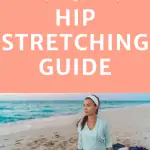This page contains affiliate links. I’m part of the lululemon collective and will receive a commission if you make a purchase through the links below. As an Amazon Associate, I earn from qualifying purchases. Read the full disclosure here.
Welcome to the hip flexibility exercise library! On this page, you can find step by step stretches for hips and glutes.
To learn more about these muscle groups and how they work together during movement, read Anatomy for Exercise: Lower Body Muscles.
For additional tips of stretching and injury prevention, check out How To Avoid Overstretching Your Muscles.
Disclaimer: This content is for educational purposes and is not medical advice. Read the full disclaimer.
Hip flexors
The hip flexors propel the leg forward while walking and draw the knee closer to the chest. They are often a neglected group and can become tight and weakened with prolonged inactivity.
The perception of tight hip flexors is common with both tightness and weakness of muscle groups and is also commonly associated with low back pain.
Related read: What Causes Tight Hip Flexors?
Kneeling psoas stretch
The kneeling hip flexor stretch is one I commonly see performed incorrectly. Many bring the hip into extreme extension and arch the back; in reality, this is not the most effective position to stretch the psoas.
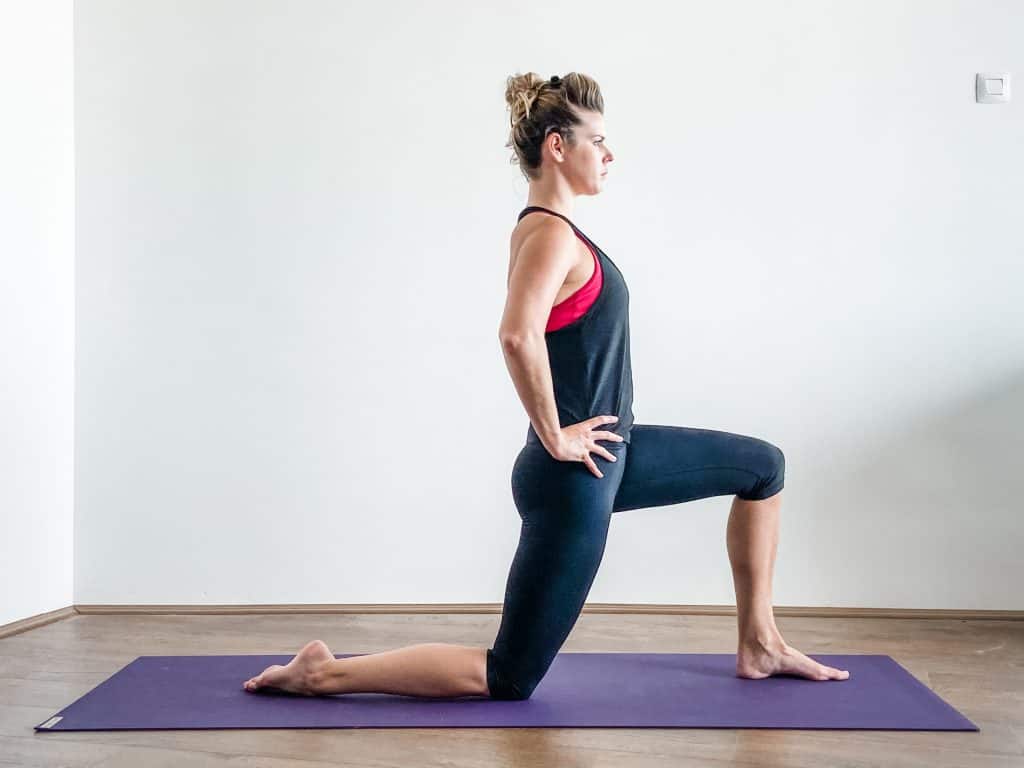
How to perform:
- Kneel on a padded surface or blanket for knee joint comfort.
- Step one foot forward at a 90-degree angle. (The kneeling leg will get the stretch.)
- Lift yourself up tall and roll the pelvis under (tuck under or posterior tilt are other cues).
- Maintain this position as you translate slightly forward until you feel a pulling in the front of the hip and thigh. If the right knee is down, the right hip will be the one getting the stretch.
- Hold for 20-30 seconds, keep breathing deeply.
- Repeat 2-3 times.
Supine hip flexor stretch
This can be a great option if your hip flexors are tight or you’re just looking for a more relaxed option.
It’s also more gentle if you have hip or knee pain.
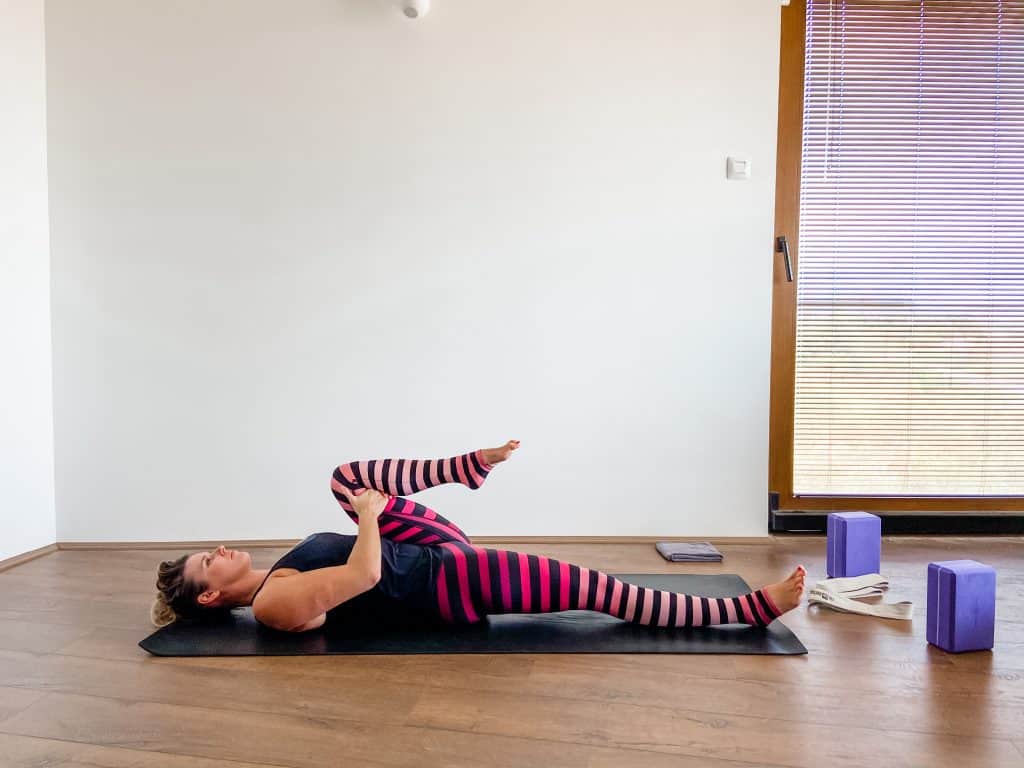
How to perform:
- Lie flat on your back and bring one knee into your chest.
- The leg that’s out straight is the leg getting the stretch.
- Intensify the stretch by pressing the leg down into the ground.
- Hold 20-30 seconds, keep breathing deeply.
- Repeat 2-3 times.
Hip flexor stretch with a block
Using a block under the hips is a gentle yet intense hip opener. Those with low back pain or SI joint issues should use caution or avoid this stretch.
Alternatively, you could fold up a towel in the shape of a yoga block for a softer experience.
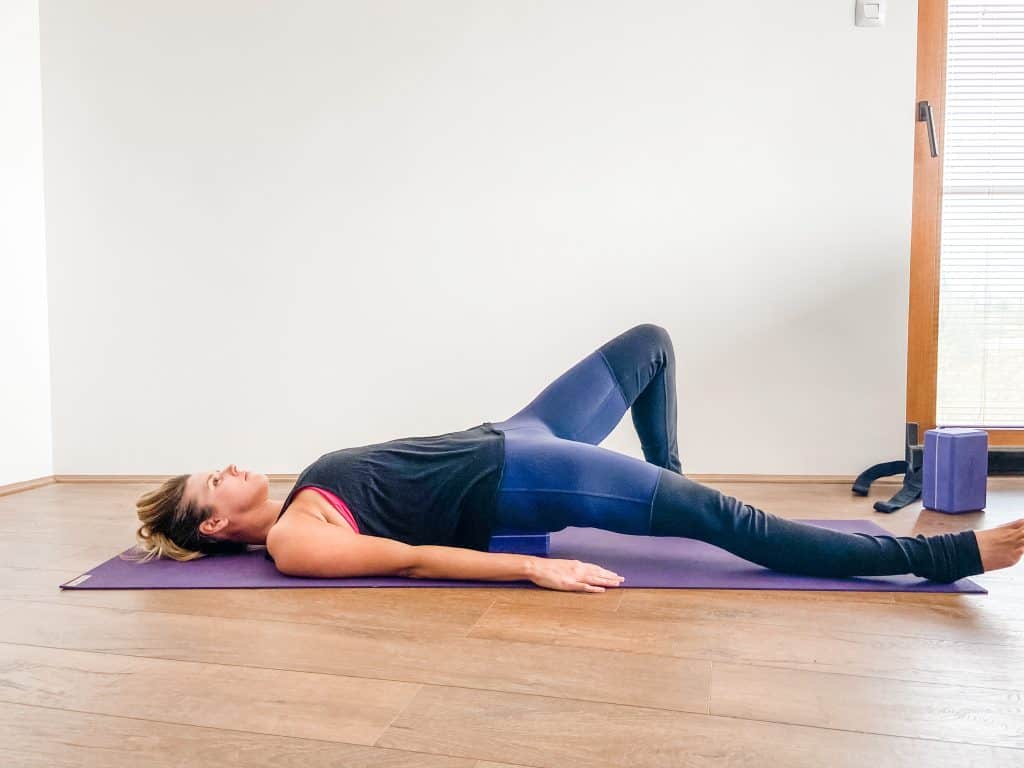
How to perform:
- Lying on your back with your knees bent, lift the hips and place a block under the sacrum.
- Gently slide one leg out straight, keeping the heel in contact with the ground.
- Allow gravity to pull down on the leg and gently open the front of the hip.
- Stay here for 30 seconds to 1 minute.
- To come out of this position, brace your abdominals, bend the knee and slide the heel back toward the hip.
Foam rolling for hip flexors
Note that the iliopsoas is one of the primary hip flexors; however, due to its deep location in the abdomen, you’re not actually going to be foam rolling this muscle.
Other muscles that assist with hip flexion, rectus femoris (one of the four quad muscles), sartorius, along with fascia, are more superficial and can benefit from this exercise.
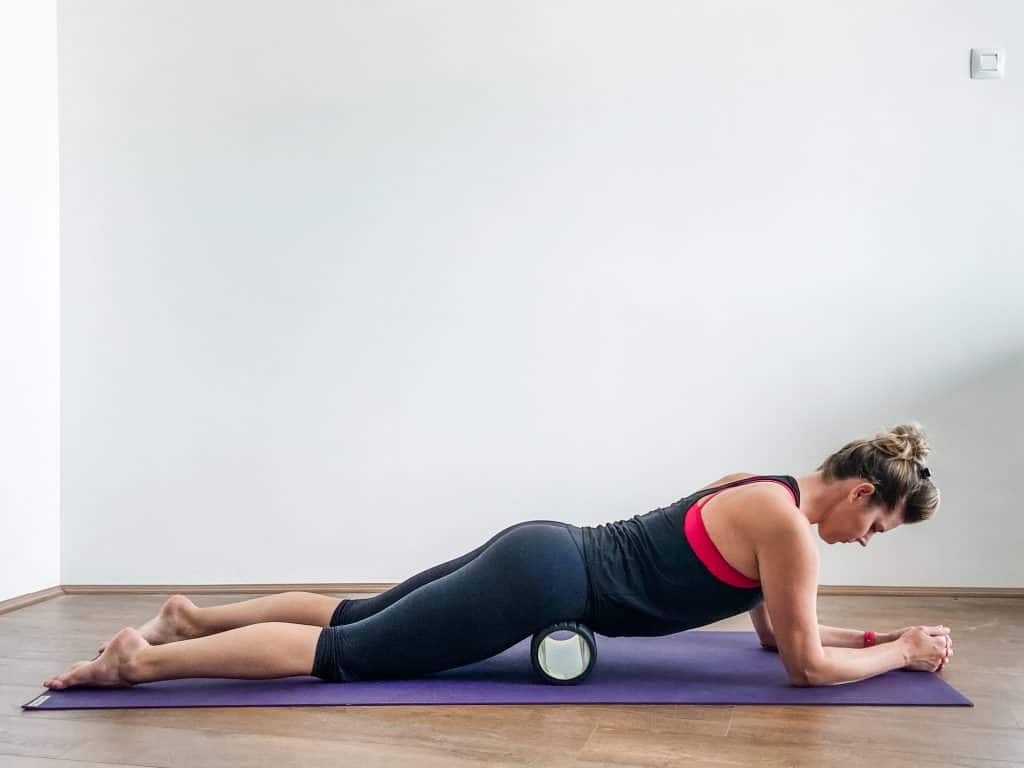
How to perform
- Locate the “hip bones” on the front of the pelvis.
- The area you’re looking to release is between the front of the pelvis and the very top of the thighs.
- Lie face down and place the foam roller where the hips meet the pelvis.
- Support yourself on your elbows as if you were in a plank position.
- Do not roll higher than the “hip bones” on the pelvis, even just staying still and allowing the hips to melt into the foam roller will feel relieving.
- Perform for 30 seconds to 2 minutes.
TFL (tensor fascia latae) & IT Band
The TFL (tensor fascia latae) is one of the muscles that attach to the IT Band. Because of its location, it’s difficult to stretch; this is one of the best stretches I’ve found to target the TFL.
TFL (tensor fascia latae) stretch
Notice I’m not calling it an IT Band stretch? Read why you can’t stretch the IT Band here.
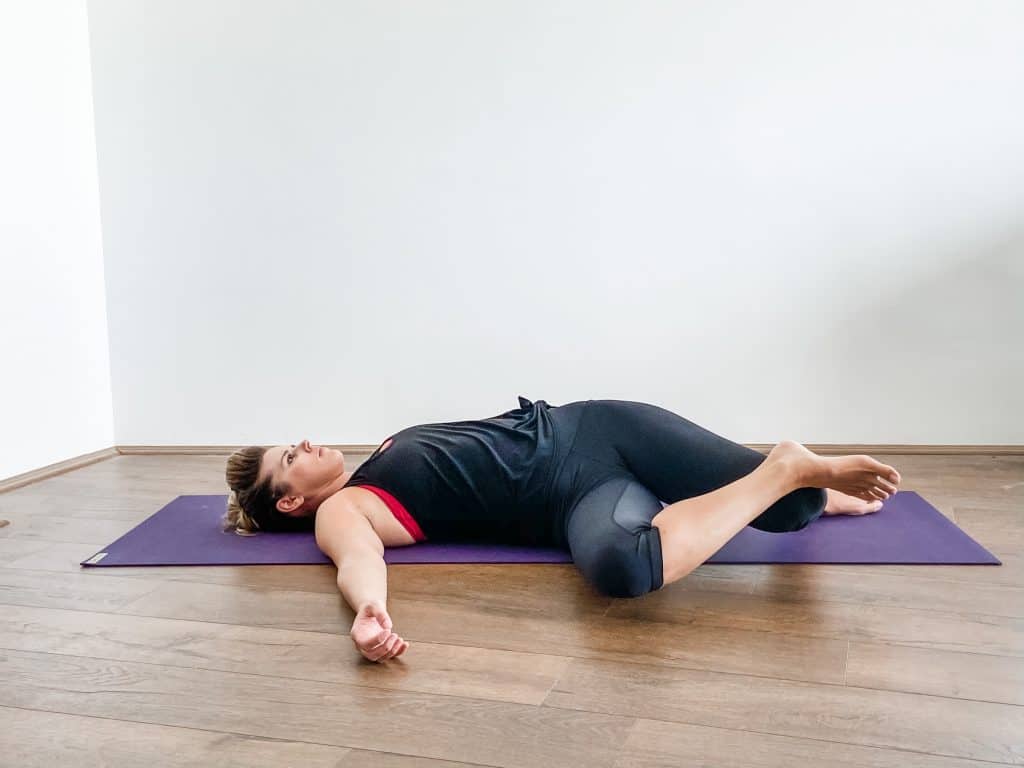
How to perform:
- Lie on your back with your knees bent.
- Cross the right ankle over the left knee.
- Drop both knees to the side.
- Hold 20-30 seconds.
- Repeat 2-3 times and on the opposite side if needed.
Foam rolling for TFL
The TFL is located halfway between the front and side of the hip. Foam rolling the TFL muscle (in addition to other treatments) can help with recovering from IT Band Syndrome.
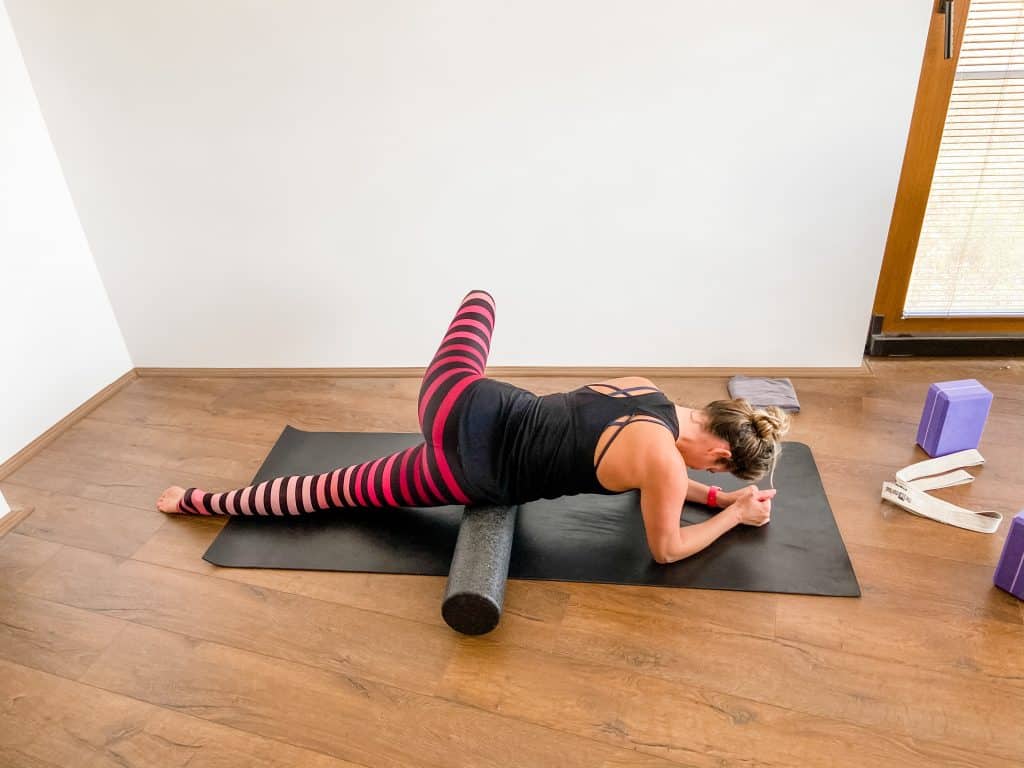
How to perform:
- Locate the “hip bones” on the front of the pelvis. The TFL is located around a 45-degree angle from the pelvis.
- Lie face down and place the foam roller where the hips meet the pelvis and roll halfway to your side.
- The TFL is a small muscle, only about 3 inches long; however, trigger points can be intense.
- Perform for 30 seconds to 2 minutes.
Hip adductors (inner thigh)
The adductors are a major muscle group located at the inner thigh that function to bring the leg into the midline as well as provide strength and stability to the hip, for example, during squats.
Butterfly stretch
AKA Cobbler’s pose in yoga is an easy way to get into the adductors. Blocks or blankets can be used underneath the knees to support your ROM and still allow you to sink deeper into the stretch.
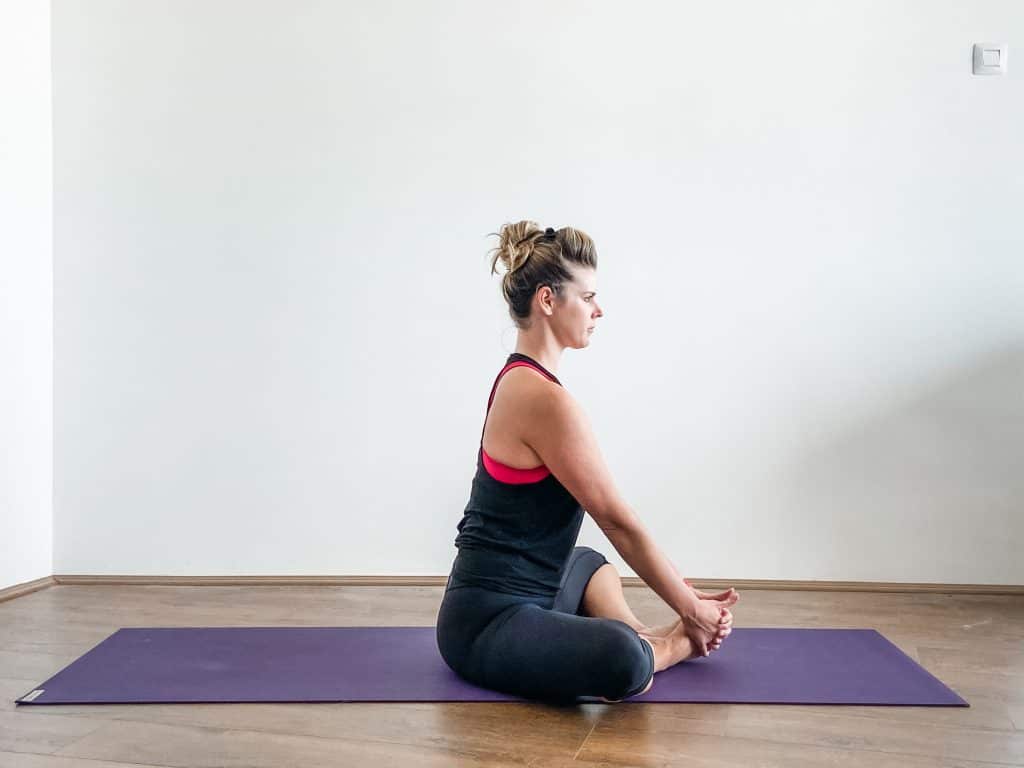
How to perform:
- Sit up tall and place the soles of the feet together.
- Bring the heels toward your seat in a comfortable position for you.
- This may be enough of a stretch, or you can begin to lean forward from your chest, hinging at the hips.
- Hold 20-30 seconds, keep breathing deeply.
- Repeat 2-3 times.
Foam rolling for adductors
There’s some assembly required to foam roll the adductors, but if you have the range of motion to do so, it can be intense.
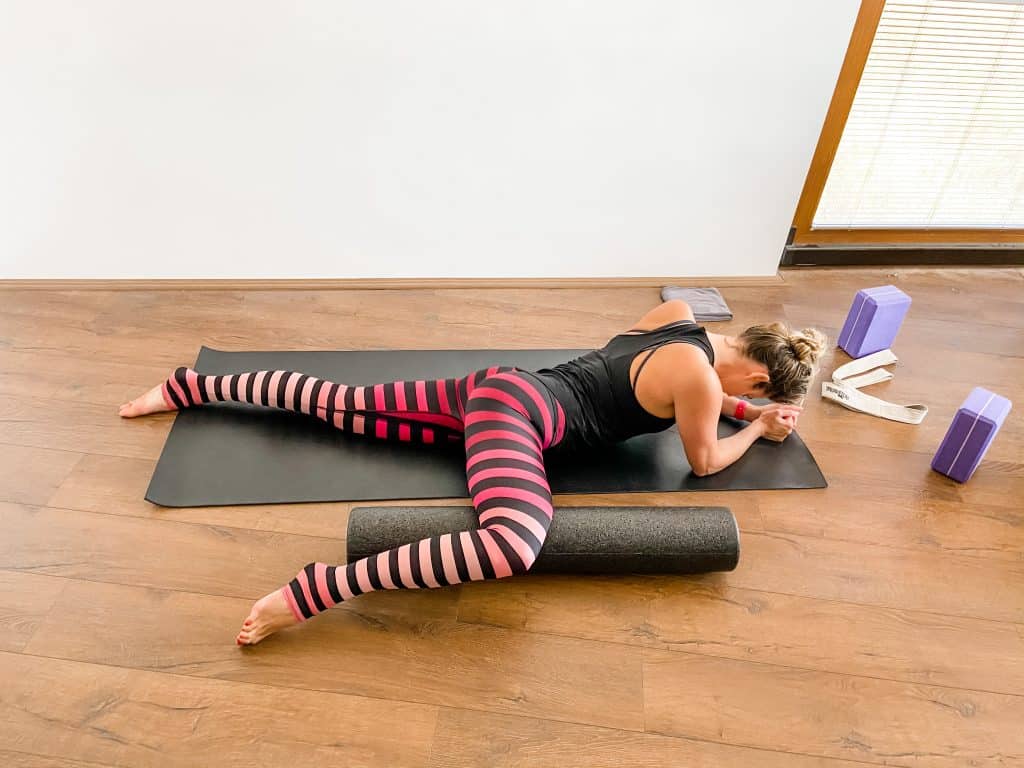
How to perform:
- Lie on your stomach in a sphinx position
- Place the foam roller parallel to you and bring one leg up on to the roller.
- Slowly roll from just above the knee, all the way up to the pelvis.
- Perform for 2-3 minutes.
Glutes/Hip Rotators
Glut max is one of the largest and most powerful muscles in the body. The primary function acting on the lower body is to extend and externally rotate the hip. The lateral side of the muscle inserts with the IT band, contributing to lateral stability at the hip and knee.
Figure 4 stretch
The figure 4 stretch is pretty much how it sounds and can be a very accessible way for anyone to target the glutes and hip rotators.
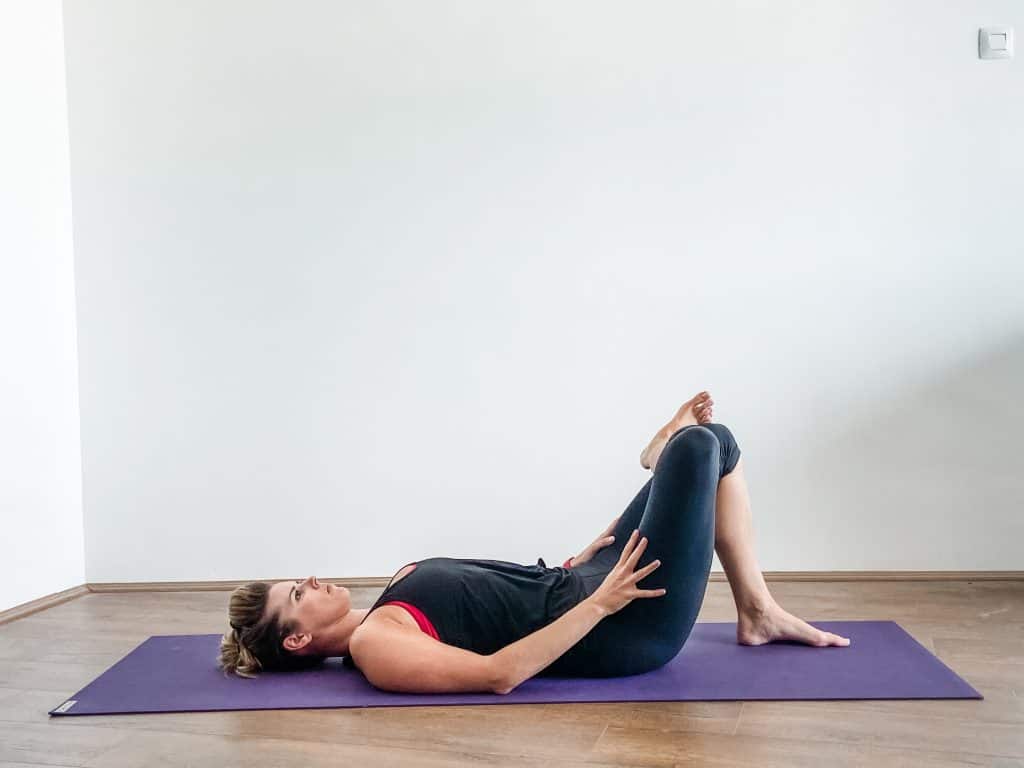
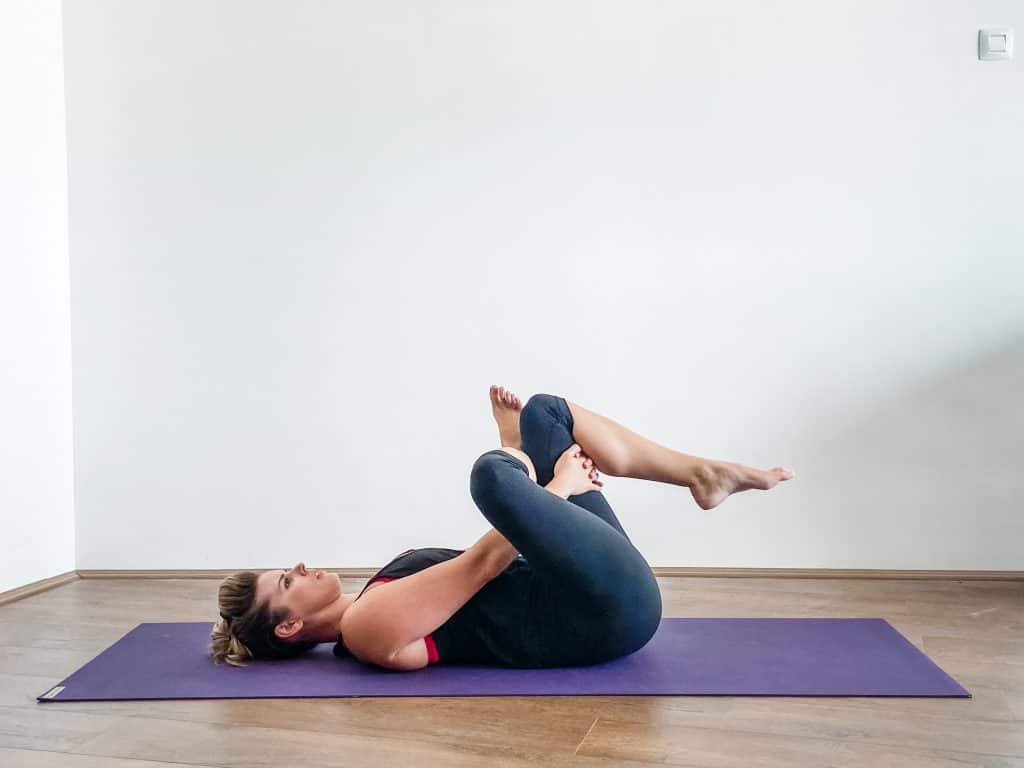
How to perform:
- Lie on your back with your knees bent
- Cross one ankle over the opposite knee and flex the foot (this helps protect the knee joint)
- This may be enough of a stretch, or you might choose to push the knee away gently.
- For a deeper stretch, you can grab ahold of the opposite leg either with your hands or a strap and draw the knee closer to your chest.
- Hold 20-30 seconds.
- Repeat 2-3 times.
Piriformis stretch
The piriformis is an external rotator of the hip, so to specifically target this muscle, you need a few tweaks from the figure 4 stretch.
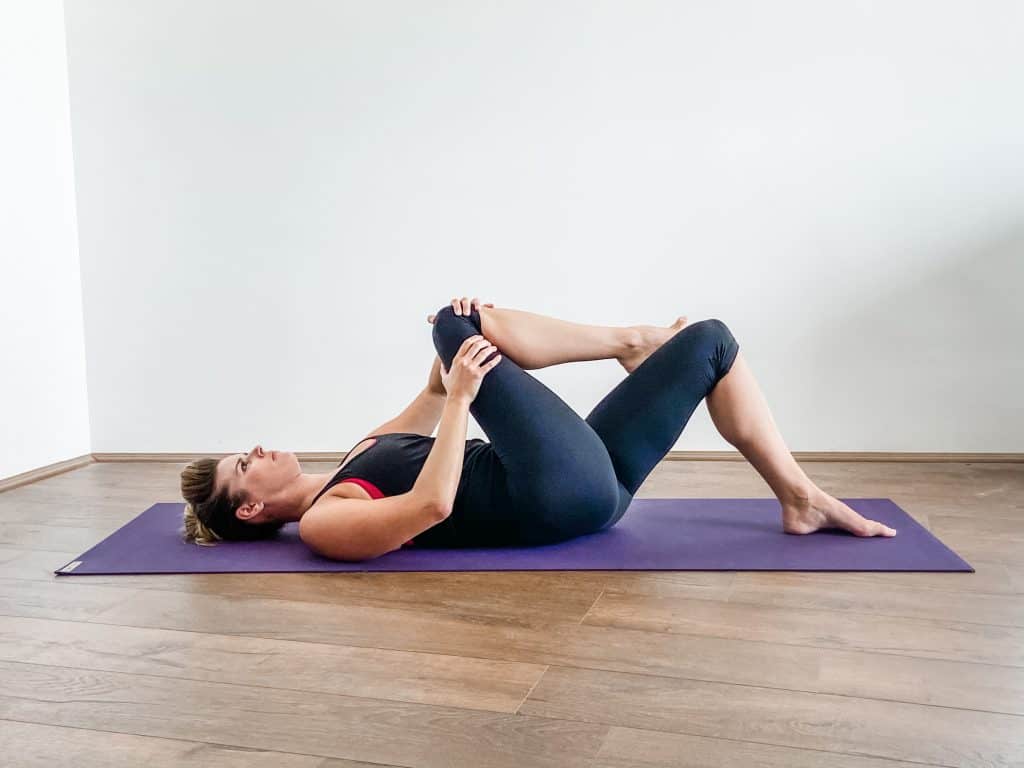
How to perform:
- Lie on your back with your knees bent
- Draw one knee into the opposite shoulder, try to keep the hips on the ground.
- Hold 20-30 seconds
- Repeat 2-3 times
Pigeon Pose
Pigeon is one of my favorite yoga poses to stretch the hip rotators. The back leg also gets a hip flexor stretch, so this pose packs a lot of benefits.
There are many variations of this pose, depending on your flexibility; this is just one option with recommendations on how to get in and out of the pose safely.
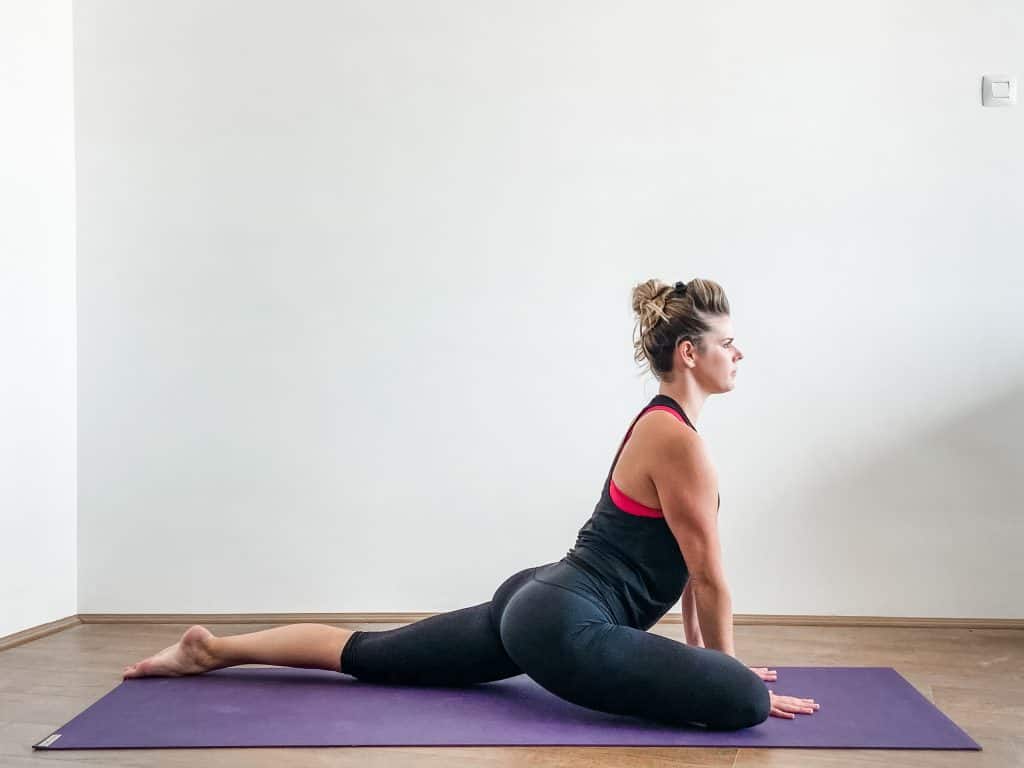
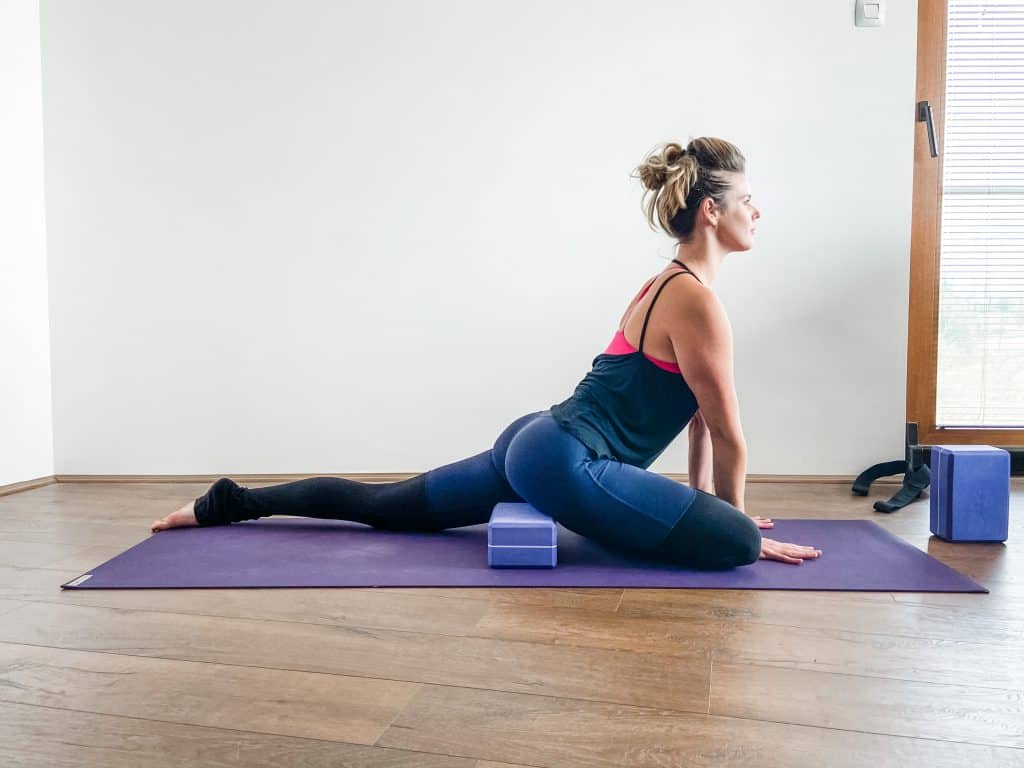
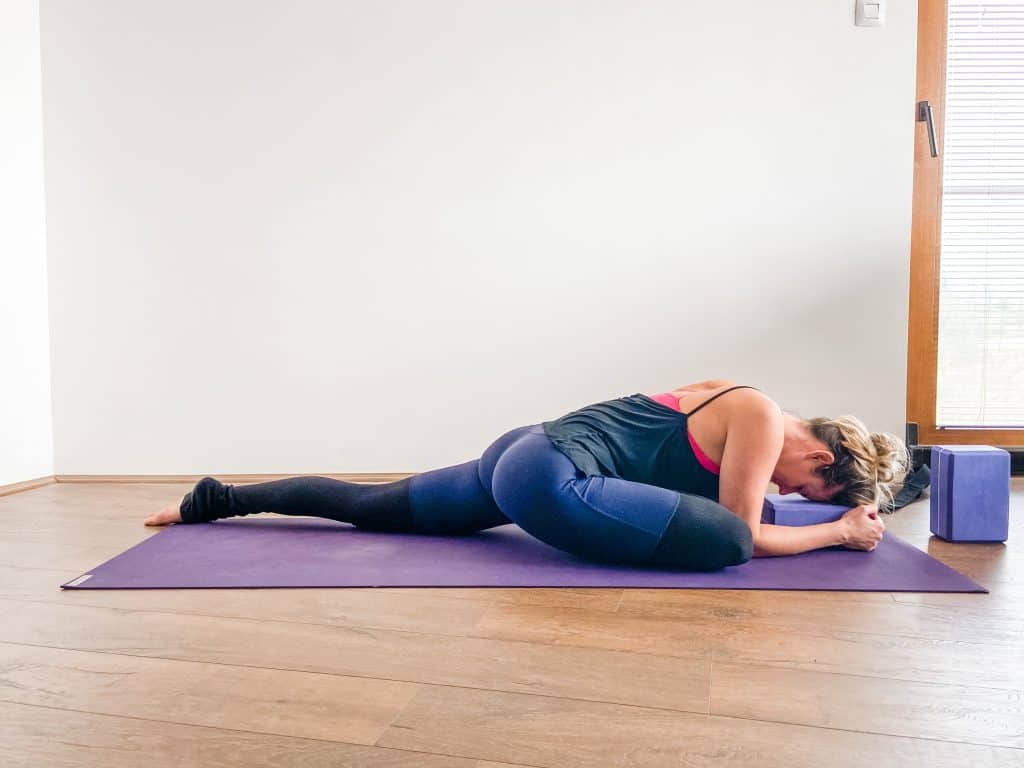
How to perform:
- From a plank position, bring the R knee behind the R wrist and gently lower your hips.
- The shin DOES NOT NEED to be parallel to the top of the mat. This is entirely dependent on your anatomy. Forcing your leg into this position can result in hip and knee injuries, and it’s not necessary!
- For tight hips, place a block or blanket under the hips to support and keep the pelvis level.
- From here, any variation can work. You can stay upright, or lower the upper body to a block or the mat. It’s your choice.
To come out of pigeon:
- Slowly bring your hands back up to your hips and lift the upper body.
- Tuck the back toes and press up to a downward-facing dog, taking any movements to shake out after the intense stretch.
- From here, you can make your way to the opposite side.
Foam rolling for glutes
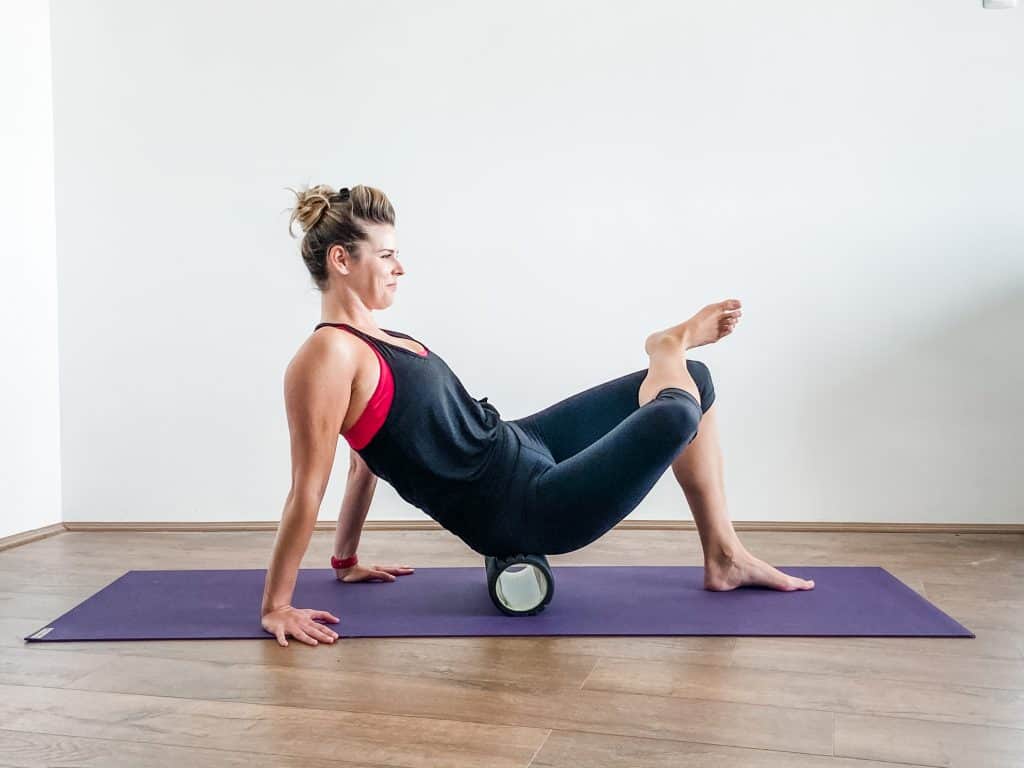
How to perform
- Sit on the foam roller and support yourself with your hands on the floor behind you. Your feet will also be flat on the floor as if you were in a “crab walk” position.
- One side at a time, shift over onto one glut and slowly roll back and forth.
- Crossing that ankle to the opposite knee in a figure 4 position will intensify the stretch.
More Flexibility Resources
Equipment & Accessories
Shop foam rollers at Dick’s Sporting Goods and ProSource Fit
Shop yoga blocks and straps at Gaiam and Clever Yoga
Best yoga mats:

